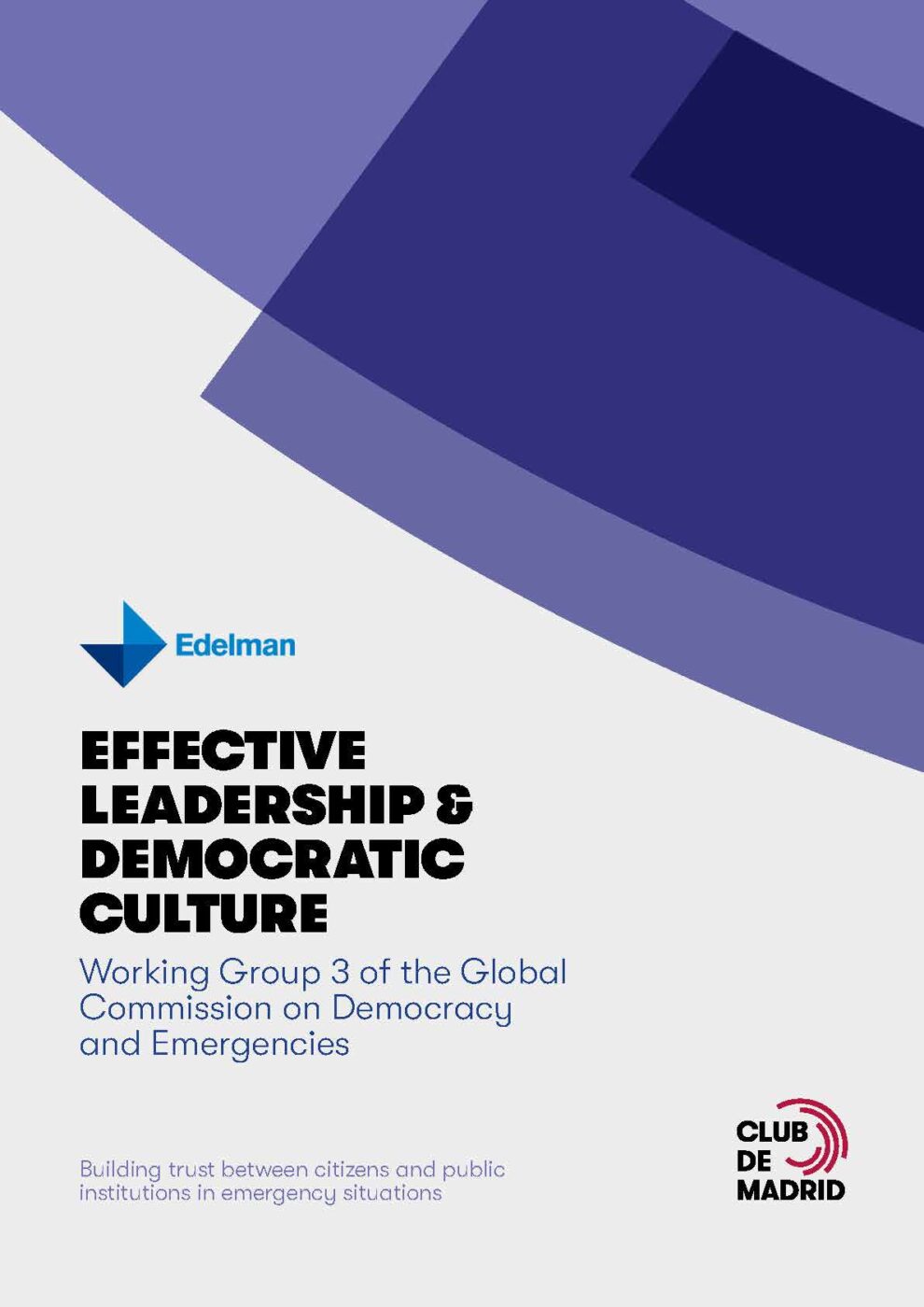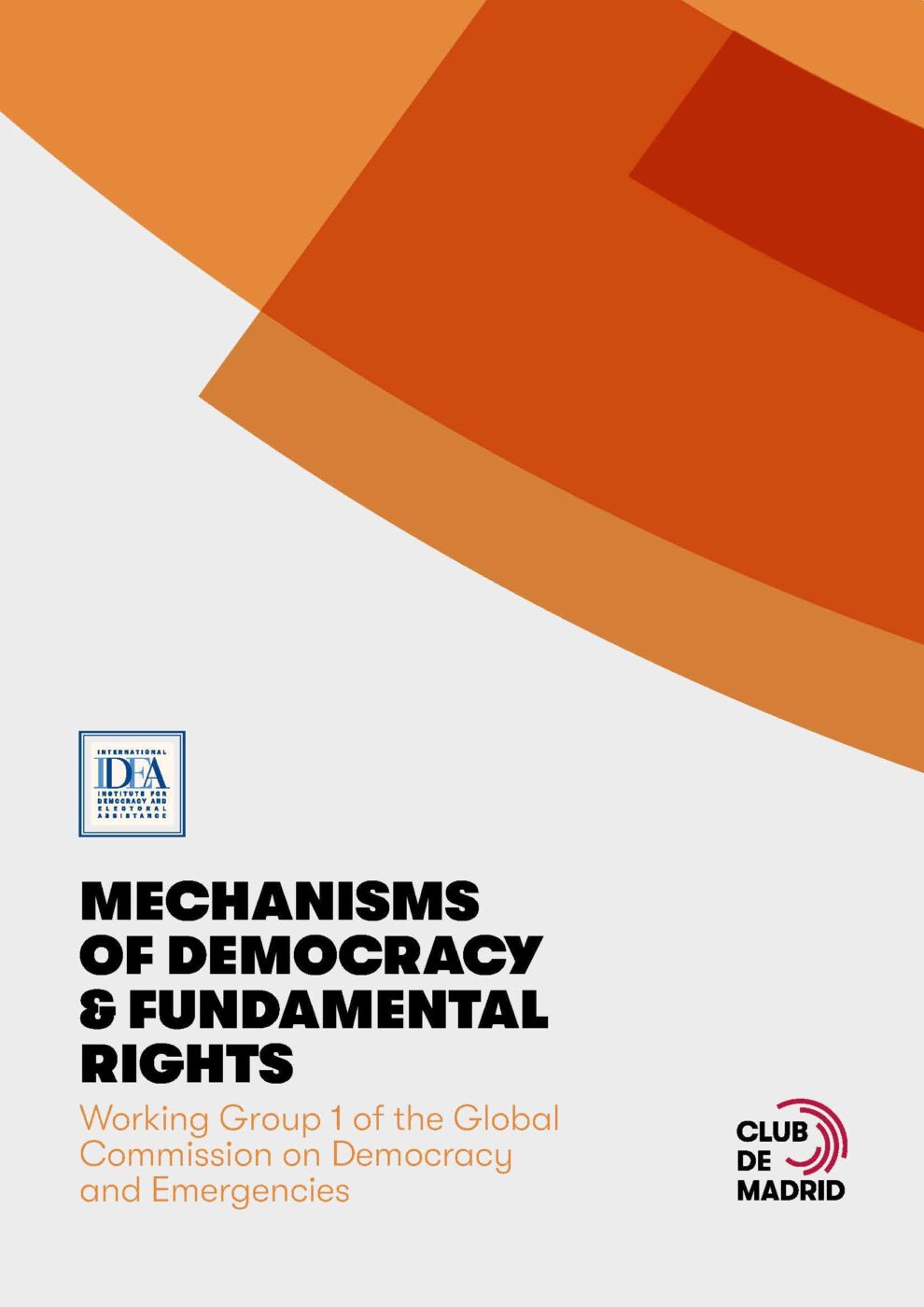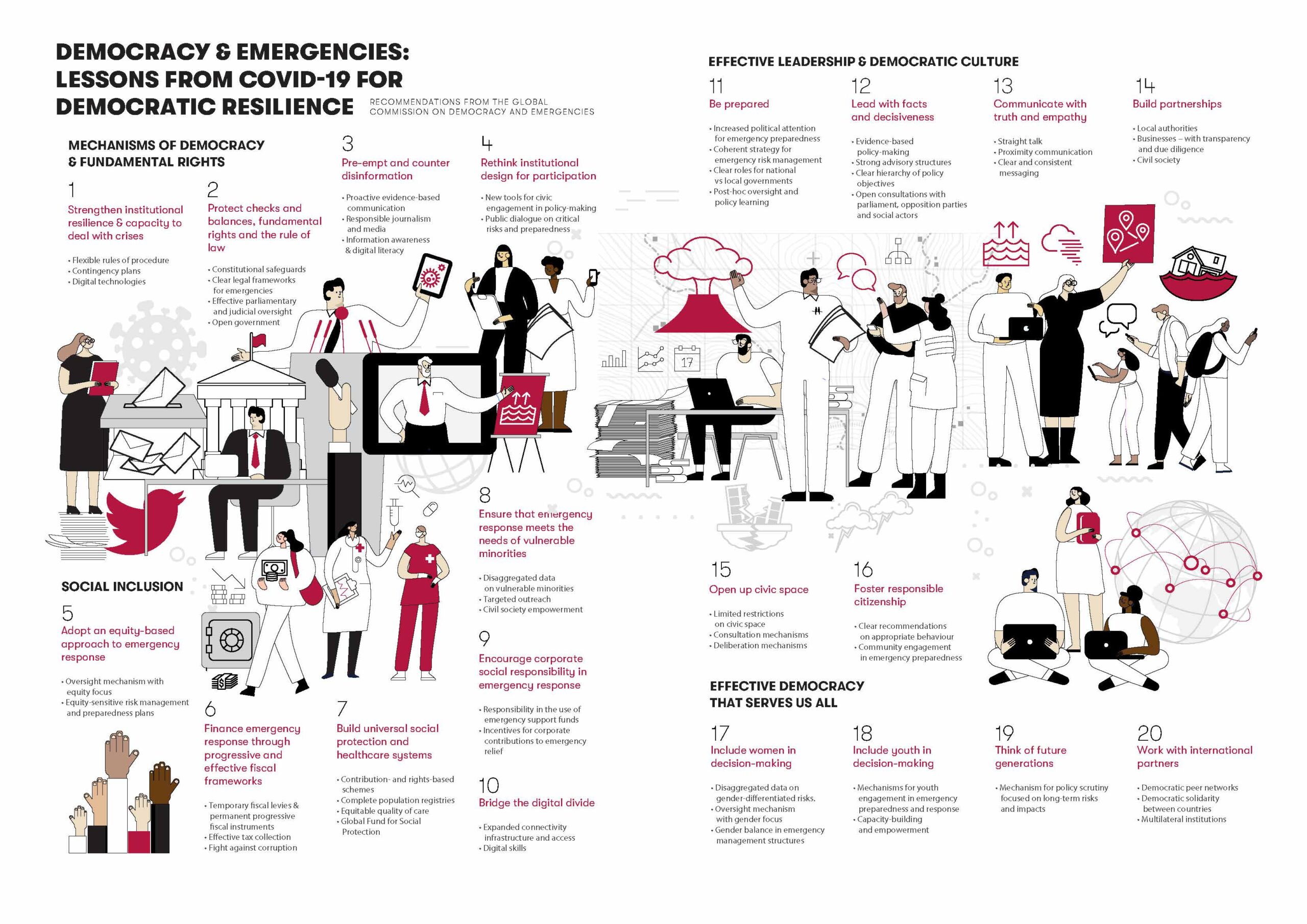COVID-19 hit at a challenging time for democracy. The pandemic galvanised a series of preexisting trends -a crisis of trust and representation, populism, polarization, etc- and brought other weaknesses and new challenges into the spotlight. With democracy indicators at historical lows, it is imperative for democracies to draw lessons from their COVID-19 experience to face future emergencies more effectively and democratically.
To impulse such learning, Club de Madrid convened the Global Commission on Democracy and Emergencies, with financial support from Fundación ACS. The Commission was chaired by former Prime Minister of Belgium Yves Leterme, with former Prime Minister of Senegal Aminata Touré and Secretary-General of International IDEA Kevin Casas-Zamora as vice-chairs, and brought together 16 commissioners for nine months of consultation and deliberation. Three knowledge partners – International IDEA, Oxfam International, and Edelman – provided data, analysis and basic frameworks for their reflections. You can find their own reports below.
The Global Commission’s report ‘Democracy and Emergencies: Lessons from the COVID-19 pandemic for democratic resilience’ presents a series of 20 recommendations, directed at government leaders, public institutions and civil society in all democratic countries. It puts forward concrete, feasible suggestions to strengthen democracies’ ability to keep their democratic institutions working in emergencies; to protect fundamental rights and the rule of law during emergency response; to deliver services, including emergency support services, inclusively to all citizens; and to respond to crises with the kind of leadership that preserves trust and gathers all of society around a shared commitment to democratic values and principles.
Below you can check out the full report and an infographic summarizing the 20 recommendations.

Access the Comission’s Minisite
Click on the infographic below to see a full-resolution version.
Working Group 3 Paper – Edelman -“Effective Leadership and Democratic Culture”
On International Day of Epidemic Preparedness (27 December), we are launching the paper “Effective Leadership and Democratic Culture”, Edelman’s contribution to Club de Madrid’s Global Commission on Democracy and Emergency’s Working Group 3. The report lays out different ideas and recommendations on how leaders and institutions can build trust in the context of emergency situations.

Working Group 2 Paper – Oxfam – ‘Responding with Equality’
On the occasion of International Solidarity Day (20 December), we released a paper led by Oxfam, our partner for the Global Commission’s Working Group 2. The paper is titled “Responding with equality: The case for combating extreme inequality to tackle crises, strengthen democracy and foster a fairer future in the wake of the coronavirus pandemic” and you can access it at the button below.

Working Group 1 Paper – International IDEA – ‘Mechanisms of Democracy and Fundamental Rights’
The paper titled “Mechanisms of Democracy and Fundamental Rights” was led by International IDEA as part of Club de Madrid’s Global Commission on Democracy and Emergencies. Access it at the button below.

Global Commission on Democracy and Emergencies – Background
COVID-19 has been shaking societies around the world for over a year. In the democratic world, the pandemic erupted in the context of a crisis of democracy long in the making. In some countries, it precipitated a worrisome deterioration of democratic governance. In others, it provided an opportunity for democratic leaders to rise to the occasion and regain citizens’ trust. In most countries, however, COVID-19 has cast a spotlight on previously unnoticed or insufficiently attended systemic flaws that have limited democracy’s capacity to function, deliver, be trusted and come out of the crisis unscathed. It is now the democratic community’s responsibility to identify and remedy these flaws before a new emergency arises.
To this end, Club de Madrid convened a Global Commission on Democracy and Emergencies.
The democratic community can build on its own collective democratic experience to meet the titanic task ahead. Through the Global Commission on Democracy and Emergencies, Club de Madrid is leading a global conversation among political leaders and policy experts to formulate recommendations, based on the COVID-19 experience, to enhance the ability of democracy to function, to deliver, to be trusted and to command the enduring commitment of citizens in the midst of emergency situations and the subsequent recovery process.
Yves Leterme presents the Global Commission on Democracy and Emergencies
Meet the Commissioners
The Global Commission is chaired by Yves Leterme (former Prime Minister of Belgium), with Aminata Touré (former Prime Minister of Senegal) and Kevin Casas-Zamora (Secretary-General of International IDEA and former Vice-President of Costa Rica) as vice-chairs.
The Commissioners are:
-Danilo Türk, President of Club de Madrid and President of Slovenia (2007-2012)
-Kim Campbell, Member of Club de Madrid, Prime Minister of Canada (1993)
-Helen Clark, Member of Club de Madrid, Prime Minister of New Zealand (1999-2008)
-Hanna Suchocka, Member of Club de Madrid, Prime Minister of Poland (1992-1993)
-Han Seung-soo, Member of Club de Madrid, Prime Minister of Korea (2008-2009)
-Ernesto Zedillo, Member of Club de Madrid, President of Mexico (1994-2000)
-Elhadj As Sy, Chair of The Kofi Annan Foundation Board
-Ted Piccone, Chief Engagement Officer of the World Justice Project
-Martin Chungong, Secretary-General of Inter-Parliamentary Union (IPU)
-Annika Savill, Executive Head, United Nations Democracy Fund (UNDEF)
-Samir Saran, President, The Observer Research Foundation (ORF)
-Maria A. Ressa, CEO and President of Rappler Inc
Guest experts and knowledge partners will also enrich the Global Commission’s deliberations with additional views coming from multilateral organizations, academic institutions, civil society and the private sector.
Three pillars of democratic resilience
The Global Commission’s deliberations will stretch over several months, leading to the publication in late 2021 of a final report reflecting a thorough understanding of democratic systems, a real politik perspective on possible reforms, and an honest exchange of ideas across democratic traditions. It will put forward recommendations on three pillars of democratic resilience.
The mechanisms of democracy & fundamental rights
COVID-19 has occasioned perturbations to the mechanisms of democracy and the ability of democratic systems to protect fundamental rights. Not only has the pandemic affected elections and the normal functioning of public institutions; but preserving public health safety has also required limits on fundamental rights, from freedom of assembly to children’s right to education.
Social inclusion
The pandemic has shown to be a particularly dire threat when combined with the realities of social exclusion. With socio-economic status a key determinant of individuals’ ability to protect their health and withstand the economic consequences of COVID-19, the pandemic has exposed and amplified existing inequalities of wealth, gender, race, ethnicity and religion. Flagrant gaps in the ability of democratic systems to deliver equitable health and economic protection to all citizens have given rise to growing calls for a new social contract, and recovery plans focused on social justice and inclusion.
Effective leadership and democratic culture
COVID-19 is also proving to be a litmus test for political leadership. The unprecedented combination of a pandemic and an infodemic has put pressure on the mechanisms of political communication, policy coordination, transparency and accountability. The space for civil society engagement in policy-making has suffered, and a growing sense of emergency fatigue has affected citizens’ reaction to, and trust in, government action.
